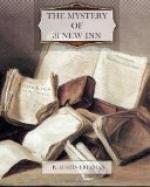“I think they do bear on it very directly. I thought so while Mr. Britton was making his very illuminating remarks.”
“I don’t see how. In fact I cannot see why you are going into the question of the signatures at all. The signature on the will is admittedly genuine, and that seems to me to dispose of the whole affair.”
“My dear Jervis,” said he, “you and Marchmont are allowing yourselves to be obsessed by a particular fact—a very striking and weighty fact, I will admit, but still, only an isolated fact. Jeffrey Blackmore executed his will in a regular manner, complying with all the necessary formalities and conditions. In the face of that single circumstance you and Marchmont would ‘chuck up the sponge,’ as the old pugilists expressed it. Now that is a great mistake. You should never allow yourself to be bullied and browbeaten by a single fact.”
“But, my dear Thorndyke!” I protested, “this fact seems to be final. It covers all possibilities—–unless you can suggest any other that would cancel it.”
“I could suggest a dozen,” he replied. “Let us take an instance. Supposing Jeffrey executed this will for a wager; that he immediately revoked it and made a fresh will, that he placed the latter in the custody of some person and that that person has suppressed it.”
“Surely you do not make this suggestion seriously!” I exclaimed.
“Certainly I do not,” he replied with a smile. “I merely give it as an instance to show that your final and absolute fact is really only conditional on there being no other fact that cancels it.”
“Do you think he might have made a third will?”
“It is obviously possible. A man who makes two wills may make three or more; but I may say that I see no present reason for assuming the existence of another will. What I want to impress on you is the necessity of considering all the facts instead of bumping heavily against the most conspicuous one and forgetting all the rest. By the way, here is a little problem for you. What was the object of which these are the parts?”
He pushed across the table a little cardboard box, having first removed the lid. In it were a number of very small pieces of broken glass, some of which had been cemented together by their edges.
“These, I suppose,” said I, looking with considerable curiosity at the little collection, “are the pieces of glass that we picked up in poor Blackmore’s bedroom?”
“Yes. You see that Polton has been endeavouring to reconstitute the object, whatever it was; but he has not been very successful, for the fragments were too small and irregular and the collection too incomplete. However, here is a specimen, built up of six small pieces, which exhibits the general character of the object fairly well.”
He picked out the little irregularly shaped object and handed it to me; and I could not but admire the neatness with which Polton had joined the tiny fragments together.




